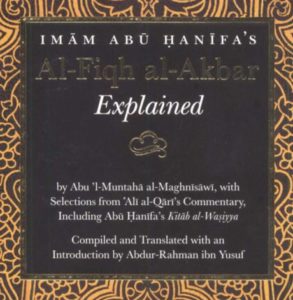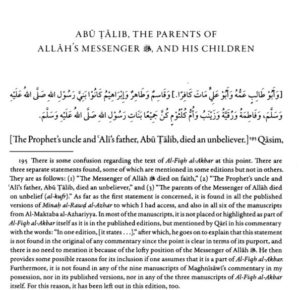 [Following is an excerpt from the footnotes on Fiqh al-Akbar of Imam Abu Haneefah rh. Mufti Abdur Rahman Mangera explains the discrepancy in the manuscripts and a resolution for the misunderstanding]
[Following is an excerpt from the footnotes on Fiqh al-Akbar of Imam Abu Haneefah rh. Mufti Abdur Rahman Mangera explains the discrepancy in the manuscripts and a resolution for the misunderstanding]
There is some confusion regarding the text of AI-Fiqh al-Akbar at this point. There are three separate statements found, some of which are mentioned in some editions but not in others. They are as follows:
(1) “The Messenger of Allah ﷺ died on faith,”
(2) “The Prophet’s uncle and ‘Ali’s father, Abu Talib, died an unbeliever,” and
(3) “The parents ofthe Messenger of Allah died on unbelief (al-kufr).”
….
The third statement is very problematic. Although, it has not been included in any of the published editions of AI-Fiqh al-Akbar and its commentaries, with the exception of AI-Qawl al-Fasl, it is found in some form or the other in nearly all the manuscripts available to me.
Shaykh Ghawji’s published edition does include it as part of Qari’s commentary in brackets. One of the manuscripts of this commentary (MS. 2743) adds, “or they died onjitra (primordial nature)” after it, and one of the manuscripts of AI-Fiqh al-Akbar (MS. 5844) has the word ”al-jahiliyya” (ignorance) in place of ”al-kufr.”
Another manuscript of Maghnisawi’s commentary (MS. 41174) has what seems like ”al-kufr” crossed out and ”al-fitra” (natural disposition) written after it. No doubt since Qari commented on it and also initially took the path that he did of considering the parents of the Messenger ﷺ to be unbelievers (he reverted from this opinion later as highlighted in his commentary of Qadi Iyadh’s Al-Shifa’ 1:601), he considered it part of the original.
Shaykh Zahid al-Kawtharl strongly denies the authenticity of this statement being from Abu Hanifa and expresses hope that someone would republish the work after comparing the manuscripts of the Library of Egypt with those at the Library of ‘Arif Hikmat in Madlna Munawwara, which he considers to be the most authentic and reliable.
In his introduction to the five books of the Imam, Kawthari writes, “In some ofthose  manuscripts, it states, ‘The parents of the Prophet ﷺ died on the fitra: and the word al-fitra is easily altered to al-kufr in the Kufic script. However, in the majority of the manuscripts, it is Ma Maata `ala al kufr – ‘They did not die on unbelief.’ Hafiz Muhammad al-Murtada al-Zabidi, the commentator of the Ihya’ and Qamus says in his treatise Al-Intisar Ii Waliday al-Nabiyy al-Mukhtar (Support for the Parents of the Chosen Prophet), “When the copyist saw a repetition of the word ma in ma mata ; he took one of them to be superfluous and removed it, after which this incorrect rendering became widespread. The proof for this is the context itself, for if the parents and Abu Talib had both been in the same state, then the Imam would have placed all three of them together in one sentence with a single judgment and not in two separate sentences [as is the case here ].’ This is a well-founded opinion from Hafiz al Zabidi, except that he had not seen the edition that contained the words “ma mata” but had quoted it from someone who had:’ Kawtharl then says, “l, with all praise to Allah, have seen it with the words “ma mata” in two manuscripts in the Library of Egypt just as a friend of mine has seen the words “ma mata” and “alal fitra” in two old manuscripts in the library of Shaykh ai-Islam Arif Hikmat. ‘Ail al-Qari based his commentary on the incorrect version and acted unethically (may Allah forgive him)” (Kawtharl 7-8).
manuscripts, it states, ‘The parents of the Prophet ﷺ died on the fitra: and the word al-fitra is easily altered to al-kufr in the Kufic script. However, in the majority of the manuscripts, it is Ma Maata `ala al kufr – ‘They did not die on unbelief.’ Hafiz Muhammad al-Murtada al-Zabidi, the commentator of the Ihya’ and Qamus says in his treatise Al-Intisar Ii Waliday al-Nabiyy al-Mukhtar (Support for the Parents of the Chosen Prophet), “When the copyist saw a repetition of the word ma in ma mata ; he took one of them to be superfluous and removed it, after which this incorrect rendering became widespread. The proof for this is the context itself, for if the parents and Abu Talib had both been in the same state, then the Imam would have placed all three of them together in one sentence with a single judgment and not in two separate sentences [as is the case here ].’ This is a well-founded opinion from Hafiz al Zabidi, except that he had not seen the edition that contained the words “ma mata” but had quoted it from someone who had:’ Kawtharl then says, “l, with all praise to Allah, have seen it with the words “ma mata” in two manuscripts in the Library of Egypt just as a friend of mine has seen the words “ma mata” and “alal fitra” in two old manuscripts in the library of Shaykh ai-Islam Arif Hikmat. ‘Ail al-Qari based his commentary on the incorrect version and acted unethically (may Allah forgive him)” (Kawtharl 7-8).
Among the manuscripts I have, MS. 74634, written in 1150/1737, contains some comments and notes in its margins written by an ‘Umar ibn Mustafa al Amidi al Diyarbakri, who happens to be one ofthe main students of Zabidi. He writes that toward the end ofthe ‘Abbasid era in 600/1203, the issue regarding the parents of Allah’s Messenger ﷺ came up, which led to a great difference of opinion. Some said the same as what Qari said and others opposed the position. This controversy over the words ofthe Imam perturbed the Caliph greatly and so he sent people to research every edition of the work they could find in libraries and in private collections. They came across a manuscript written by the third [Hanafi] Imam [Muhammad al-Shaybani] which had been read in front of the Imam [Abu Hanifa] in the presence ofthe rest of the class. It contained the following statement: “The parents of the Messenger of Allah ﷺ did not die (ma mata) on unbelief (al-kufr):’
The Caliph also sent someone to Kufa, where he found another edition also containing the same words; they deemed the Kufan work to be the correct version and rectified their copies.” Diyarbakri mentions the same point that Zabidi made regarding the likelihood of a copyist error given that many copyists were unlearned (in religious sciences) and could have thought the ma was a stray word and removed it. He then says, “What I have written is correct, I have shown it to my shaykh, liegelord, and master Abul Fayd Muhammad al Murtada, And Allah knows best.
I have left this statement out in this edition following the majority of the published editions of this work.
al-Fiqh al-Akbar Explained
Mufti Abdur Rahman ibn Yusuf Mangera
Page 209-211